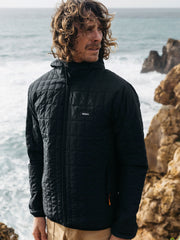Somewhere off the coast of Cape Town, between the kelp forest, the reefs and the open ocean; you’ll find Hanli Prinsloo. We may all be 60% water, but Hanli knows it better than most. Freediving champion. Ocean guardian. Communer with sharks. Take a dive with one of Finisterre’s long-time partners in adventure.
Hanli Prinsloo | Beneath The Surface
04.24.18
4 min read
Image by Peter Marshall
Growing up on a rural horse farm outside Johannesburg, Hanli was given two rules: “Come back before the sun sets. And don’t die.”
An early taste for the wild places grows into a love affair with the ocean. A yearning for the deep and the quiet takes Hanli into competitive freediving and back out again, leaving 11 broken records in her wake. And now, still exploring on a single breath, Hanli is channelling her energy into bringing about a sea change in approaches to conservation.
Her I AM WATER foundation works to reconnect local communities with the ocean, while I AM WATER Ocean Travel raises funds by taking paying clients on awe-inspiring ocean adventures. Both are guided by Hanli’s belief in the uniquely transformative power of ocean experiences. So who better to guide Finisterre through South Africa’s underwater wild lands; to take us face to face with sharks and home before sunset, fully intact? Snatching a rare moment on dry land, we talk the practical power of wonder, learning surf tricks from dolphins and what happened when our team hit Cape Town this spring…
Hanli, you’re one of the ocean’s most devoted advocates. Where does the story begin?
It started with a very close connection to nature. I grew up nowhere close to the ocean, but from a very early age I was completely immersed in wild nature – no towns close by, no neighbours. Growing older, the only place I could find that kind of release was in the ocean.
Was learning to freedive a big part of that?
Freediving competitively was my key into this close connection I built with the ocean. Learning the skills to be in that wilderness, deepening my understanding of my own body. It made that relationship with the sea deeper; understanding how my body’s adapted for being underwater – that we have these similarities to whales and dolphins and seals; that this is not a foreign place, and that my instinct of feeling at home here is correct physiologically as well.
Although it’s a great tool for me now, for exploring, I don't need the competitive side anymore. But I’m so grateful for the lessons it taught me about myself, the insight into my strengths and weaknesses. And a humility – you can't be the same person in the ocean that you are on land.
“You can’t be the same person in the ocean that you are on land.
How did that experience feed into the conservation work that you’re doing now?
We only change our behaviour if we feel deeply connected to something. When I was getting involved in conservation, I looked at the organisations around me. There was so much good work, but what I didn't see, in the way that I'd experienced it, was how completely one's life is transformed when you feel so strongly and powerfully a part of something greater than yourself. I decided, if I can institutionalise that drug, then we can start creating change!
I'm a South African who grew up very privileged in a very messed up system, so I also wanted to see how we could make experiences that have been very limited for the majority of our population more accessible. That’s why I AM WATER has that combination of conservation and social uplift.
So where do you think the conservation focus should be right now?
I'm heartened to see this tipping point when it comes to plastics – but I really want to see people integrate this awareness around single use plastics into the greater sphere of how we live. There’s this general throwaway culture. Whether it’s trying to understand how one’s carbon footprint gets bigger or smaller – climate change and ocean acidification are terrifying to me; or, I can’t understand how people can call themselves ocean lovers and eat seafood indiscriminately.
I think some people who live so far from the sea feel disconnected. They think, “The ocean does nothing for me. I've never swum in it, I've never seen a whale. And I'm so far from it, how could my action have an impact?” It's that shift that needs to happen. Every second breath you take, that oxygen is coming from the ocean. It’s about trying to be both emotionally connected, but also well informed enough to make the right decisions.
We don’t want to create a care fatigue, you know, “I just can't care anymore, you just made me care about single use plastics, and now over-fishing too, I'm tired!” We have to keep balancing it out with hope, and beauty, and love. That's where I think the ocean experiences come in. Even for myself, when I start feeling like every day with conservation is an uphill battle – I go for a surf, I go for a swim in the kelp forest. I'm revitalised. I just want to figure out how one can give that to other people as well.
Do you clock an immediate response when you share these kinds of experiences with people?
Across the board, whether it's kids getting to see kelp forests, urchins and octopus for the first time, or paying guests getting to see a whale, or dolphins, or manta rays. There’s always this absolute sense of awe and wonder. There’s a big shift towards mindfulness practice at the moment. We all see these studies that tell us everyone should be meditating, and still we struggle to make time for it. Most people will never get there.
But once you step into the ocean you experience the most extreme form of meditation and mindfulness without needing to give it any fancy terms. You are completely present, completely connected, and completely in awe. It’s that moment that always strikes me again and again; whether it’s an 11-year-old kid from a township in a kelp forest, or a high-paying guest from New York in the South Pacific with a humpback whale. It's the same moment, it’s the same experience, it's the same connection.
“Once you step into the ocean you experience the most extreme form of meditation and mindfulness without needing to give it any fancy terms. You are completely present, completely connected, and completely in awe. It’s that moment that always strikes me again and again.”
So what about a group of coldwater surfers from the UK? Same thing?
Oh my gosh, yes, are you kidding? Noah and James hardly wanted to go home. I took them freediving in what I like to call 'our garden', the kelp forest in the bay where we stay. We got them in their wetsuits and passed down some masks, snorkels and fins and ventured out into the chilly water, which luckily they're used to!
It was incredible to see them dive down into the kelp forest and see the brightly coloured urchins and fish. So much life. We saw three different shark species, we saw rays, we saw octopus, we saw absolutely everything. It was like the ocean was saying: “These are our people, let’s show them stuff, we know these guys.” They couldn't believe how much life there was.
It's always fun when you’re with like-minded hardened ocean souls, to share that childlike enthusiasm again. That's something I cherish and foster; I never feel blasé. Every single experience is remarkable. You'll find me the loudest, most excited, exclaiming about things that I've seen 100 times, because it is that incredible every single time. It was such an unforgettable day; it was crystal, crystal clear. Absolutely beautiful.
And the sharks?
We paddled out on the stand-up paddle boards and when you see it from above, and you know you're in one of the sharkiest bays in the world, and you're on the board – that’s when it’s scary. But when you put the mask on and you get in the water, you start feeling that cozy homey feeling of, 'This is fine, I can see all these guys', and it's not a threat, you know?
It was so much fun, it really really was. It's just so easy to impress people with Cape Town. There's so much – the mountains, the ocean, the surf, the food, the wildlife, the whole lifestyle here.
Will you be sticking around for summer, or heading off on adventures?
From the end of April, we wind down our in-water experiences, and Peter and I start travelling. We’ll be on the road for two months flat without coming home in between. We actually kick off our whole round the world two-month trip with a week with Finisterre Ambassador, Easkey Britton. Easkey and I feel like we’re ocean sisters, but we've never actually met. It's ridiculous because we feel like we share a brain. I'm really looking forward to that.
Lots of ocean time together then?
Yes! We'll be doing lots of bodysurfing and surfing. One of my big passions at the moment is bodysurfing. It feels like the freediving of the surfing world. It's so much fun, you can feel that closeness to the water. You go so fast down the waves and try and pull out, or dive down, or something – before you get smashed on a rock or the sand. It’s literally how the dolphins surf as well. You can be playing with a pod of dolphins and suddenly a set comes through and they're like, 'Oh sorry human – this is more interesting!', and they just scoot off as one. Suddenly 20 dolphins will be in a wave and you'll just see tails disappearing down it.
Surfing, snorkeling around, even just staring into the rock pools – sure, there’s freediving and meeting big animals, but it doesn't have to be spectacular to be moving. When I'm not totally immersed in the ocean myself, my time is spent working on ideas on how to protect it. The ocean is my absolute everyday life.


















































































